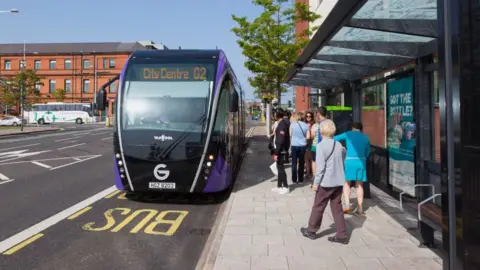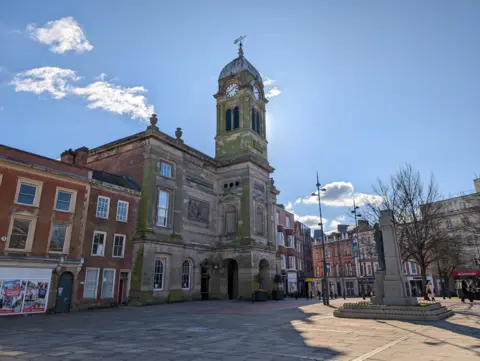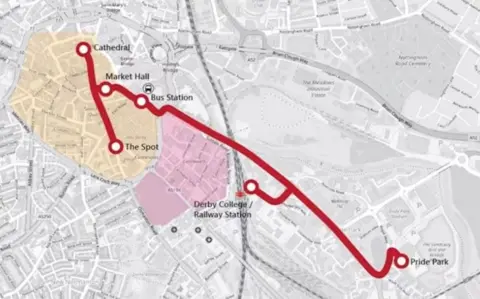Electric bus route scrapped over costs
 Getty Images
Getty ImagesPlans for an "electric rapid transit" scheme in Derby, announced in 2020, have been quietly scrapped, the BBC has learned.
Consultants were appointed to develop the £11.5m project, but the council said the Covid pandemic had changed its "economic viability".
The plan would have seen 12m-long electric vehicles using some of the city centre's pedestrianised streets to better connect the Cathedral Quarter, Derbion, bus station and railway station.
It was due to be completed by 2023, with an extension to Pride Park opening in 2024.
A contract notice published in 2022 said the bus route would operate seven days a week, and would form a "key investment in revitalising the public transport offer in the city".
The government funding, part of a £161m package to improve transport in Derby and Nottingham, has been reallocated to other projects.

The BBC submitted a Freedom of Information request to find out what had happened to the scheme, and how much was spent on it.
Just under £500,000 was spent on the aborted electric rapid transit (eRT) plan, with £11m reallocated with permission from the Department for Transport.
Plans for new Park and Ride buses were also scrapped, resulting in a further £6.4m of spare funding.
Cycle routes in Chaddesden and public realm improvements in the city centre have benefitted from the money instead.
 Derby City Council
Derby City CouncilCarmel Swan, Derby City Council's cabinet member for transport, said: "It's important to recognise that the original business cases for these schemes, which were supported by government, were developed and submitted before 2020.
"The Covid-19 pandemic changed the transport landscape and the economic viability of the transport sector.
"While we got to an advanced stage of commercial work for the eRT scheme, this showed that it was high risk in a post-Covid travel environment.
"Although the work did highlight some potential benefits – particularly improving connectivity between Pride Park and the Cathedral Quarter – the scheme would have required long-term revenue support which was not available."
Follow BBC Derby on Facebook, on X, or on Instagram. Send your story ideas to eastmidsnews@bbc.co.uk or via WhatsApp on 0808 100 2210.